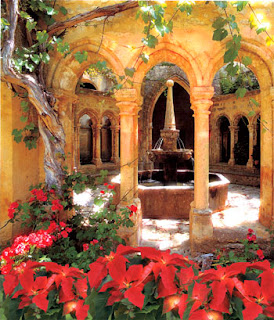The People Of The Garden (The Two
Selfish Brothers) - Story from The Quran
It was the early hours of
dawn. In its stillness, the sound of a walking stick knocking on the
stony pathway could be heard, intermittently followed by the panting of heavy
breathing as the old man made his way to his garden. It was filled with a
large variety of lush fruit trees and a cool stream meandering through its
ground. The air was rich with fragrance of many flowers. As a faint
light of the dawn was being shed, birds were chirping to awaken the sleeping
world. But this great bounty had not caused the slightest feeling of
haughtiness in the man. He was ever mindful of the blessings of his
Lord. He laid out his prayer mat and thanked Allah for His favours.
He allowed everyone to roam in his
garden, to enjoy its beauty, as long as they did not spoil it. At
harvesting time he would invite the poor and give them a generous share of his
crops. And if his labourers left anything unharvested, the poor were
allowed to gather it for themselves.
The three sons
The old man had three sons, two of
whom were unlike their father. Their father’s generosity annoyed
them. One of them remarked, “Father, in giving so generously to the
poor you are reducing our portions.” The second son added, “Father, your
generosity will eventually turn us into beggars.” The third son was about
to say something but his father put a finger on his lips and silenced
him. He looked at his two sons sadly, and said, “My children your
belief that my giving to the poor will make you poor is a selfish
thought. This wealth over which you want full authority of is neither
yours nor mine; it belongs to Allah and I am only its trustee. I am not
allowed to spend it only on myself; the rest of Allah’s creation has a right
over it, especially the poor, needy and the wayfarer; the birds and insects
also have a due share, for they, too, are Allah’s creation. Only what
remains thereafter is our share. This is how ones wealth is purified,
blessed and increased. I have abided by this law since my youth and will
keep to it until my death. I am now bent with age and my body is riddled
with disease. My death cannot be far off. It will not be long
before you inherit all of this. You will then be faced with two choices:
if you spend your wealth in the way of Allah, as I have done, He will reward
you and bless you. But if you are selfish and do not spend it in His way,
you will lose both His bounty and blessings and end up empty-handed.
Remember my sons, this is how Allah wants things to be.”
Not long after this conversation the
father passed away. As harvesting approached, the poor, as usual, eagerly
awaited the invitation to collect their share of the crop. The sons who
were in charge now, held a meeting. One of them proposed that from that
day onward the poor shall have no share in that harvest nor would the wayfarers
have the right to enter the garden. The third son who was more like his
father, said, “What you are proposing is evil and evil begets evil. By
depriving the poor we will not benefit, instead, we may find ourselves in
need. So give what is due to them in the same way our father did when he
was a trustee of Allah’s wealth.” The other brothers became angry and said,
“Do not give us advice on what is not yours. We had enough of that
when our father was alive.” But he persisted, “Let us turn to Allah and
seek His guidance, for prayer protects men from evil.” They bluntly refused
his advice.
The following morning his brothers
rose before dawn and planned to harvest the crops and to divide it among
themselves. They hurried to the orchards, but the sight they saw stopped
them dead in their tracks. The garden had changed beyond all
recognition. It was as if they were in the place other than their
beautiful garden. Everything had withered.
When the third brother heard the
tragic news, he remarked, “See what your evil intention has brought upon us!”
The two brothers then turned to Allah and pleaded for forgiveness, “Glory be
to our Lord; Lo, we have been wrong. We beseech our Lord, and if He so Wills,
He may give us a better garden in its place.”
(Quran 63:17-33)
The lesson
Allah gives wealth as a trust in our
hand and tests us what we do with it. If we refuse to share it with
the needy, He reduces it and punishes us in many ways.
If we show sincere regret for our
wrong, Allah replaces with better whatever He takes away.
Tags:
Islamic stories

